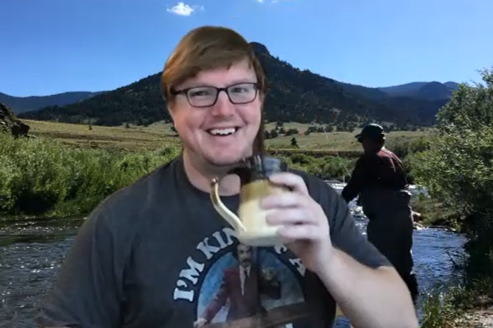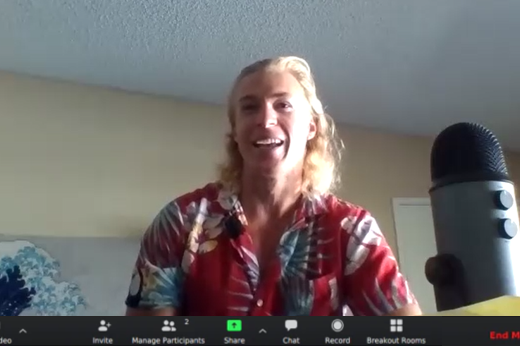

“Why would you ever want to stop learning?” Luke Wiseman, PhD, associate professor in the Department of Molecular Medicine and winner of the 2019 Outstanding Mentor Award, reflects on what his colleagues and lab members have taught him during his 11 years as a faculty advisor.
Did you ever expect to be nominated for this kind of award? What does it mean to you?
Well, I knew my lab was up to something; they’re not the best at keeping secrets. But I’m still really shocked, and I have to say it gives me a lot of confidence moving forward. To have people in my lab, past and present, communicate that I’ve done a good job means so much. To be honest, it means a lot more to me than any other awards I’ve received. Of course, it’s great to receive awards because of your science and it’s nice to have validation that people appreciate what you’re doing, but you can see much of that through citations and how people are using your work. Whereas for this sort of thing, there’s no real way of seeing it, so it’s a wonderful feeling to know that my lab members value my mentorship and want to express that.
How many lab members have you mentored?
I started the lab over a decade ago. It’s been a long time, but in many ways, it feels like only yesterday. Fifteen people have gone through my lab as either graduate students or postdocs, and there are 14 members currently. My goal is always to keep it approximately this size; if it gets much bigger than this then it would be hard to keep track of all the projects. It’s this constant battle between wanting to investigate a lot of things, but also making sure I’m available for everybody to help them. You might still have a day-to-day mentor in the lab, but I don’t want to have the type of lab where my team never sees their boss.
That’s still a sizeable group. As a PI, how do you keep track of all the different projects?
The short answer is, I don’t. I mean, I’m aware of what’s going on with each project, but I tend to focus on one project at a time. I would say that every three months or so I’m focused on something specific to a paper or a grant, and so those people are naturally getting a lot of my attention. Then that shifts to another project after those earlier ones are done. It’s not like I ignore the others, and my lab can always ask me if they have questions about their experiments. I wish I could say I was smart enough to keep it all in my head at once, but I’m really not. I rely on my people to take responsibility for their work, so for the times when I’m not constantly focused on them, they need to be expanding things on their own. And one of the best parts of my job is when they do that and come back later to show me the progress they’ve made.
What does it take to be a good mentor?
I’m 11 years in and I thought by now I’d have a formula for how to do things. But I don’t. Every single person that has come through my lab has been different and many of them just need different things. Some people need a kick in the butt, others need more of a nurturing mentorship. It takes time for that to develop and to determine how to get the best out of people. Some of that is just trial and error. Also, my job is not to turn them all into a version of me. My job is to try to figure out what they want to do, where they want to go and help them become the best version of themselves.
Who were your key mentors and how have they shaped your approach?
I’ve had great mentors throughout my career, and they’ve all been very different. I was always hard working, but I was never the smartest; luckily, all of these people took a chance on me. My first experience was with Professor Felicia Etzkorn at the University of Virginia, who let me join her lab as an undergraduate and opened the door to scientific research, showing me what it was really like. I did graduate school at Scripps Research with Professor Jeff Kelly. I joined as a synthetic chemist to make compounds, but I was terrible at it! I slowly went toward peptide chemistry, but I didn’t have the patience for that, and so I ended up finding my groove in biophysics and then cell biology. It was that sort of flexibility that allowed me to explore and work out what I wanted to do. Jeff also had a number of postdocs who would work with and help students like myself. I really valued that aspect and I try to encourage this now in my own lab. My postdoctoral advisor Professor David Ron (NYU Medical School) had a different style again; he was more hands-on and seemed to be all business, all the time. When I started my own lab, I decided to take what I liked best about all of the labs I’d worked in and combine them to make my own style. I’ve tried to adapt their strengths to who I am.
What advice would you give to trainees pursuing their own scientific career?
To students or postdocs engaged in research, I would say, ‘Be experimentally fearless. Go in whichever direction your science takes you; don’t try to force fit it into something else, just pursue whichever questions come to mind.’ Too many times we might feel limited in thinking, ‘Oh I’m a cell biologist, so I can’t do this,’ or, ‘I’m a structural biologist, so I can’t do that.’ I think that’s a mistake, especially at places like Scripps Research, which is so collaborative and where you can always find someone who is willing to help. You can work with anyone you want; you just need a good idea. And I think my lab is a pretty good demonstration of this, since we work with chemists, structural biologists, cell and experimental biologists. We do a lot of different things to ask the right questions. As far as those people who might want to start their own lab, I would say make sure you really want to take this path and if so, go in and be excited, don’t let doubts fill your mind. What I tell them is, ‘You’ve seen the mistakes I’ve made. Now go make your own and don’t make the same ones as I did.’
The Outstanding Mentor Award was created to pay tribute to the remarkable faculty who actively serve as effective mentors of graduate students and postdocs. Nominees are evaluated primarily on the content of recommendation letters submitted by current and former lab members, by a selection committee composed of members of the Career and Postdoctoral Services Office, the Graduate Office, and the Society of Fellows.